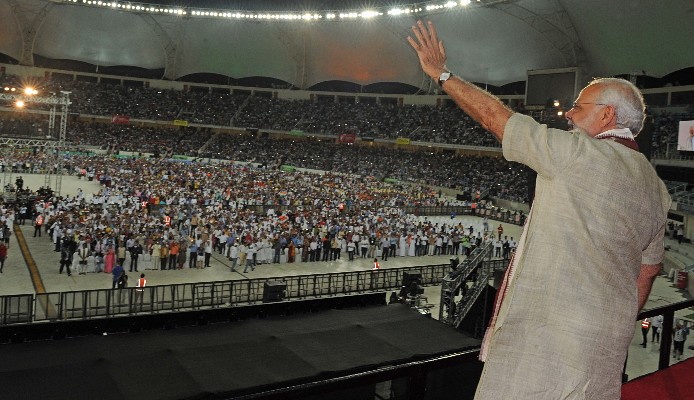Indian Soft Power Grab in The Gulf
August 28, 2019 | Expert Insights

Background
In the first week of August, the Indian government revoked Article 370 of the Indian Constitution. The article gave the Indian Muslim-majority state of Jammu and Kashmir special status. The revocation was followed by bifurcation of the state into two union territories. The action received backlash from Pakistan, which has suspended diplomatic ties.
Following the revocation of Article 370 in Jammu and Kashmir, UAE was one of the first nations to support the move as an internal decision of India.
The G7 Summit in France was the first major international gathering post the revocation, where India was represented at the highest level. Before his departure, Prime Minister Narendra Modi expressed his faith that the tour would strengthen India’s ties with ‘time-tested friends’.
The Gulf Region has been the focus of India’s soft power projection for some time now. A Comprehensive Strategic Partnership was inked with Bahrain in 2015. Both the UAE and Bahrain host a significant Indian expatriate population and mutual trade has been on the rise. In fact, the UAE is the fourth largest trading partner of India.
Analysis
The focus on enhancing soft power collaborations is clear, in Modi’s visits to Bahrain and UAE. In fact, he is the first Indian PM to ever visit Bahrain. The importance of India as a strategic partner for both countries was amply underlined by the conferring of their respective highest civilian awards on Prime Minister Modi during the course of the visit- ‘The Order of Zayed’ in UAE and the ‘King Hamad Order of the Renaissance’ in Bahrain.
Although the revocation of Article 370 largely affects people who share the same faith as these Gulf nations, response from the Gulf countries has been largely neutral, if not entirely pro-India. The reason behind this is deeply embedded in economics and India’s soft power outreach.
India is the third-largest crude oil consumer globally. Moreover, it is also home to a steadily increasing consumer market and labour pool. India presents itself as a safe and profitable destination for investment from oil revenue surpluses, that exist with most wealthy gulf nations.
With rising disposable incomes, the Indian tourist is a visible face of India in popular tourist destinations. Gulf Arab states are vying for a greater share of this lucrative Indian tourist trade. Over 10 lakh Indian tourists visited Bahrain in 2018, a figure that is expected to grow. Dubai has always been a favourite destination for Indian tourists, both for business, shopping and also for family holidays.
India has been taking the lead in digital money transactions, both domestically as also overseas through its RuPay card. This is an indigenous Indian equivalent of a Mastercard or Visa. Rupay scheme by the Reserve Bank of India originated in 2012 with the vision to create a domestic and multilateral payment gateway. RuPay has already been launched in Singapore and Bhutan.
An important economic achievement of the visit was the formal launch of the RuPay card to expand cashless transactions both in UAE and in Bahrain. UAE became the first Gulf nation to allow transactions using RuPay. In Bahrain, an MOU was signed to kickstart the process of introducing the RuPay card.
In a humanitarian gesture during the course of the visit, Bahrain released 250 Indian prisoners.
The UAE is India’s third-largest trade partner with an annual bilateral trade of $60 billion. It is also the fourth largest exporter of crude oil for India. With approximately 3.3 million Indians residing in UAE, the Indian community is the largest expat population. Consequently, in 2018 the highest foreign remittance- to the tune of US $ 17 billion (out of total remittances amounting to US $ 69 Billion) came from the UAE. Remittance figures are expected to grow. Bilateral ties between the two countries have grown steadily over the years and impressed by India’s achievements in space technology, the partnership is being expanded into new sectors including space.
Bahrain has close to 350,000 Indian expats which equals to nearly 1/3 of Bahrain’s total population of 1.2 million. India- Bahrain trade topped US$ 1.3B in 2018-19.
Pakistan’s Senate chairman Sadiq Sanjrani was set to visit UAE with a delegation in the last week of August. That trip has now been cancelled
Assessment
- Focusing on visiting these two countries right before Modi’s participation in the G7 has been a strategic move.
- The visit and consequent public statements reinforced India’s position on Kashmir internationally. Unambiguous support of these important Gulf Muslim countries on a strategic issue is likely to influence the response of other Gulf/ Muslim countries.
- The launching of the RuPay card in UAE and Bahrain is an acceptance of India's position in digital transfer of money, more so in a sector dominated by global players like Visa and MasterCard. It will facilitate fund transfers between UAE/ Bahrain and India, benefiting both Indian expats/ tourists as also UAE/ Bahrain businesses.
- Both countries are prominent supporters of India’s candidacy for a permanent seat on the UNSC when India makes a formal bid in 2026-27. Their continued support has to figure high on Indian diplomatic priorities.
- The outreach sought investments from both Bahrain and the UAE, with particular reference to the opportunities now opening in Kashmir and thus partner India’s quest for a US $5 Trillion economy.
Image Courtesy: flickr.com








Comments